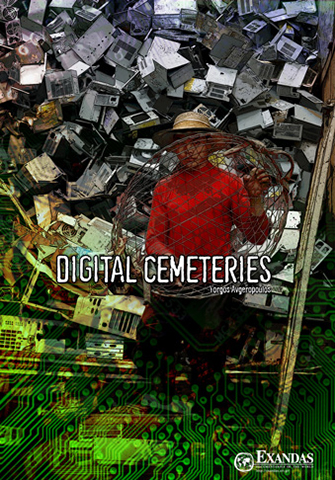
Digital Cemeteries
Dir: Yorgos AvgeropoulosComputer parts contain toxic and carcinogenic materials. When our favourite pc stops working, it turns into a dangerous electronic waste which must be recycled following rigid specifications. However, instead of managing their own electronic waste, developed countries find it cheaper to export it to poorer nations. In doing so, they force billions of people to choose between poisoning and poverty, while the planet’s seas, rivers, soil and air are being irreparably contaminated. Up to 50,000,000 tons of our “digital civilization” end up illegally in China. In cemetery cities, computers are cut into pieces, rinsed in acid baths and incinerated by legions of impoverished workers and underage children, who tear these parts to pieces with their bare hands for a dollar a day.
Watch the Film Now!
Choose the language you prefer and stream the film in Full HD from any digital device. Enjoy your private screening!
Buy the DVD
€9,99
Public Screening
Are you interested in organizing a public screening of our film? Send us an email with your inquiry and we will be glad to assist you!
Educational / Library Use
Are you interested in enriching the library of your institution with our film? Contact us and let's create together an informed public!
- DURATION: 53min
- AVAILABLE IN THE FOLLOWING LANGUAGES: English | Greek
- AVAILABLE VERSIONS: English (53min) | Greek (53min)
- YEAR OF PRODUCTION: 2008
- Written & Directed by: Yorgos Avgeropoulos
- Producer: Nina – Maria Pashalidou
- Research Coordinator: Apostolis Kaparoudakis
- Production Manager: Anastasia Skoubri
- Director of Photography: Alexis Barzos
- Editing: Yiannis Biliris, Dimitris Nikolopoulos, Meletis Pongkas
- Original Music: Yiannis Paxevanis
- Graphics: Sakis Palpanas
EARLIEST EXPLORER PRIZE
The World of Knowledge Film Festival
St. Petersburg, Russia
October 2008
PREMIO DE RESIDUOS
Cine'Eco 2008 - Festival Internacional de Cinema e Video de Ambiente
Seia, Portugal
October 2008
PREMIO ALERTA
Cine'Eco 2008 - Festival Internacional de Cinema e Video de Ambiente
Seia, Portugal
October 2008
PRODUCTION NOTES
Where does your computer go when it dies?
You are probably not aware of the fact that the inside of your computer contains toxic as well as carcinogens substances, such as lead, phosphorus, cadmium, barium, beryllium, chromium and quicksilver. A colored monitor contains an average of 1,8-3,6 kilos of lead that can easily leak in the environment when disposed into a dump. A “dead” PC is then transformed into dangerous electronic waste which requires recycling of strict technical specifications. Nevertheless, the developed world, instead of recycling the electronic waste it produces; it chooses to export it to underdeveloped countries where it is then recycled by thousands of underpaid workers. Workers who have to choose between one dollar poisoning and starvation. While a computer is being “cremated”, the air, the water and the soil of our planet are irreparable contaminated undermining our lives. Each year, up to 50 million tons of electronic waste is exported to China. There it is recycled and re-integrated as feedstock into the production chain. In China the cost of recycling such waste is thirty times lower than in Western Europe, U.S.A. and Japan. But most important, recycling procedures are not environment-friendly.
The city of Guiyu situated in Guang Dong of southern China is probably world’s biggest computers’ dump. Each day thousands of computers arrive clandestinely at Guiyu where they are cut into pieces, rinsed with acid water and finally burned for gold, silver, copper, glass and plastic.
The city looks like a giant digital dump. Abject workers, men, women and under-age children, have raised new shanty towns. Most of them are Chinese emigrants who left their homes and land to work for 1,50 dollar per day at this new lucrative industry. From East to West they collect cable and wires, hammer printers, break monitors, burn circuit boards and sort out computer parts with bare hands. This primeval death procedure of the western world’s fetish-machine releases heavy metals that penetrate into the food chain and cause death. The computers’ burial contaminates soil and fluvial water with cadmium, quicksilver, chromium, cobalt.
Local worker Lee Jason says that “People ruined this area just for the money” while adding that “The surrounding is awful. You’re walking through garbage. That’s why people call Guiyu ‘City of Garbage’ “. When you’re working the air is polluted and it no doubt damages your health, but I live here for many years and I got used to it”.
Kou, the local doctor, tries to confront dozens of illnesses with cheap western medicine and traditional herbage.
According to Kou “respiratory disorders are very common. Tuberculosis, liver cancer, stomach cancer, esophagus cancer and larynx cancer are no strangers to the people of this area”.
Our developed western civilization illegally exports its toxic waste to the Third World countries. Despite the fact that the International Basel Convention prohibits the export of dangerous waste from the richest to the poorest countries, U.S.A. and Japan (the most technologically developed countries) refused to sign it. But even the European Union members don’t always comply with the Convention. Illegal loads of e-waste often depart from the European ports. Only in the month of February 2007, there were 84 e-waste loads spotted at main European ports and border cross-points.
Even though in 2002 China issued a law prohibiting the importation of all e-waste, somehow it keeps sneaking its way into Main Land. It all comes down to two reasons: Millions of people bread-win from the recycling business while the Chinese High Officials wink. Corruption is no secret in China. The computer multi-national companies are very much aware of the repercussions recycling has on the environment. The fact that the first victims of the computer industry were the employees of Silicon Valley is not negligible. It was in the 1970s that the news broke, that various forms of cancer afflicted a number of computer workers and technicians, as well as citizens of the entire San Jose area where the company is based. Ecological Organizations have since put pressure on the manufacturing companies to take responsibility of their e-garbage. Computers with non-toxic materials, obligatory recycling centers for all big household computers names, are only a few of the recommendations.
Mr. Ping, Campaign and Communications Director of Greenpeace China, says that: “When a computer becomes a dangerous waste, it should return to the manufacturer in order to be recycled and its toxic substances handled properly. This obligation would thus give the manufacturing companies an incentive to invest larger sums in the Research and Development of ‘cleaner’ and ‘cheaper’ technology”. In the US only, 315 million computers are already, or will soon be declared obsolete. By the year 2009 the total turnover of the world’s e-waste market will reach the amount of 11 billion dollars. By 2010 the volume of e-waste in the European Union will reach 12 million tons per year. Exandas Documentaries followed the course of this distorted development pattern that threats the lives of Third World citizens and undermines the future of our planet. The course of the documentary runs from Silicon Valley, the Mecca of High Technology in California, to the vast country of China, where entire counties bread-win from recycling e-waste. In this journey Exandas visited various mid stations, BAN (Basel action Network) in Seattle, Greenpeace in London, and managed to record rare images of the dark side of the computer industry. Exandas boldly uncovers a side of China which lies far from the modern industrialized nation that feverishly prepares for the “big feast” of humanity, the Olympic Games. A dark side of the western world, one that benefits the few, and destroys the lives of many is revealed without censor.







